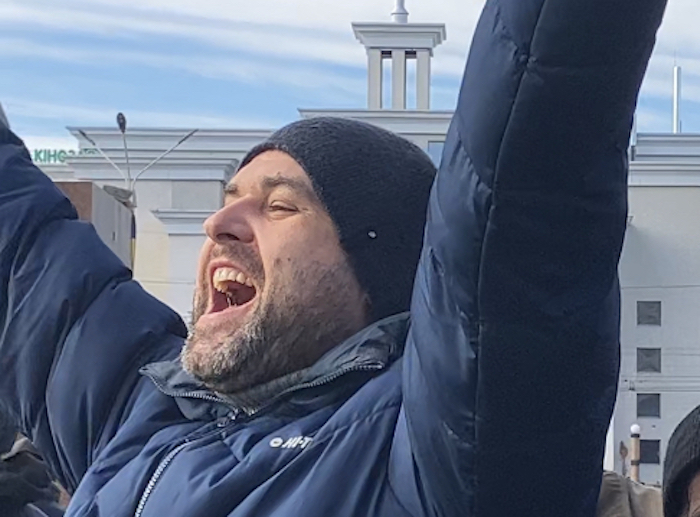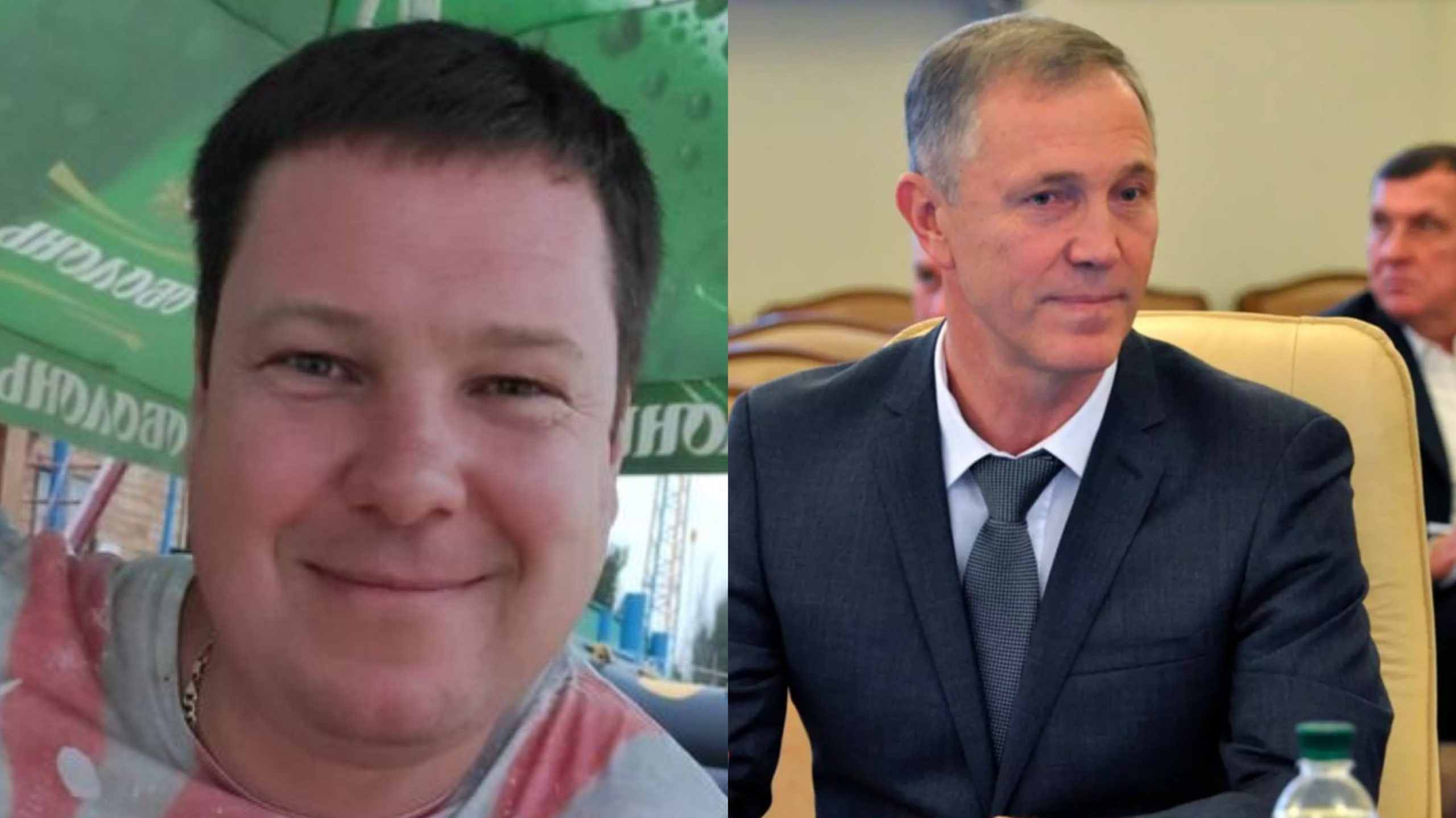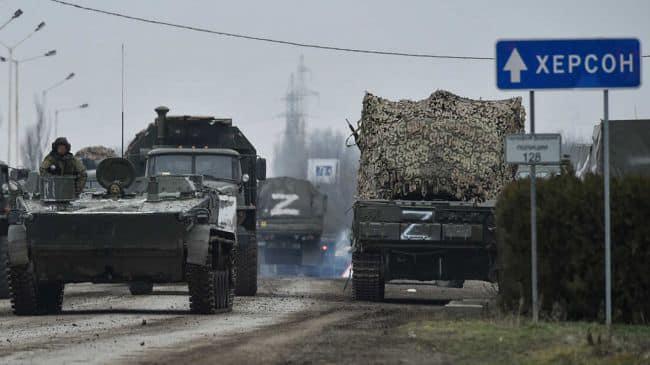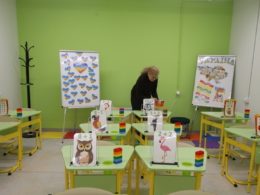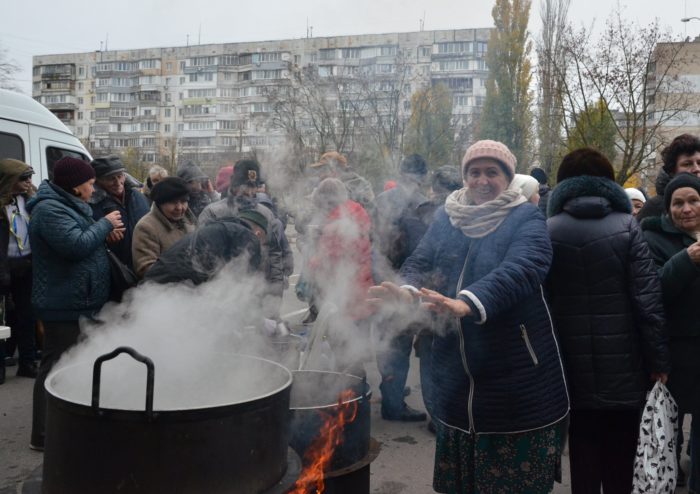While President Zelenskyy’s visit to the newly liberated Kherson was a “surprise,” the largest missile attack on Ukraine since the beginning of the full-scale Russian aggression did not surprise many.
On November 14, only three days after the liberation of the southern city, Zelenskyy met with the residents on the main square of Kherson.
Speaking to 150 journalists from around the world, Zelensky said, “I am happy. We are in Kherson. You see the reaction of the people. I think this is the answer. We did not prepare for the reaction of the people. People waited for the Ukrainian army.”
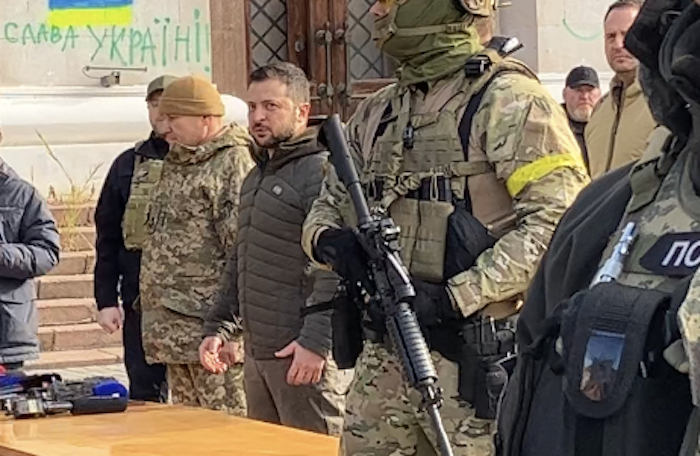
The Kremlin did not comment on Zelensky’s appearance in Kherson, the city recognized by the Russian government as the territory of the Russian Federation after a sham referendum in September 2022.
Putin’s press secretary Dmitry Peskov told journalists that there would be no comment, adding, “You know that this is the territory of the Russian Federation.”
A non-verbal comment didn’t take long. The next day, the Russian military launched about 100 Kh-101 and Kh-555 missiles on Ukraine’s power system. At least one person was killed and 15 infrastructure objects damaged, leaving entire Ukrainian oblasts without power.
Euromaidan Press visited Kherson and spoke to the people of Kherson who came to the central square to greet the Ukrainian president.
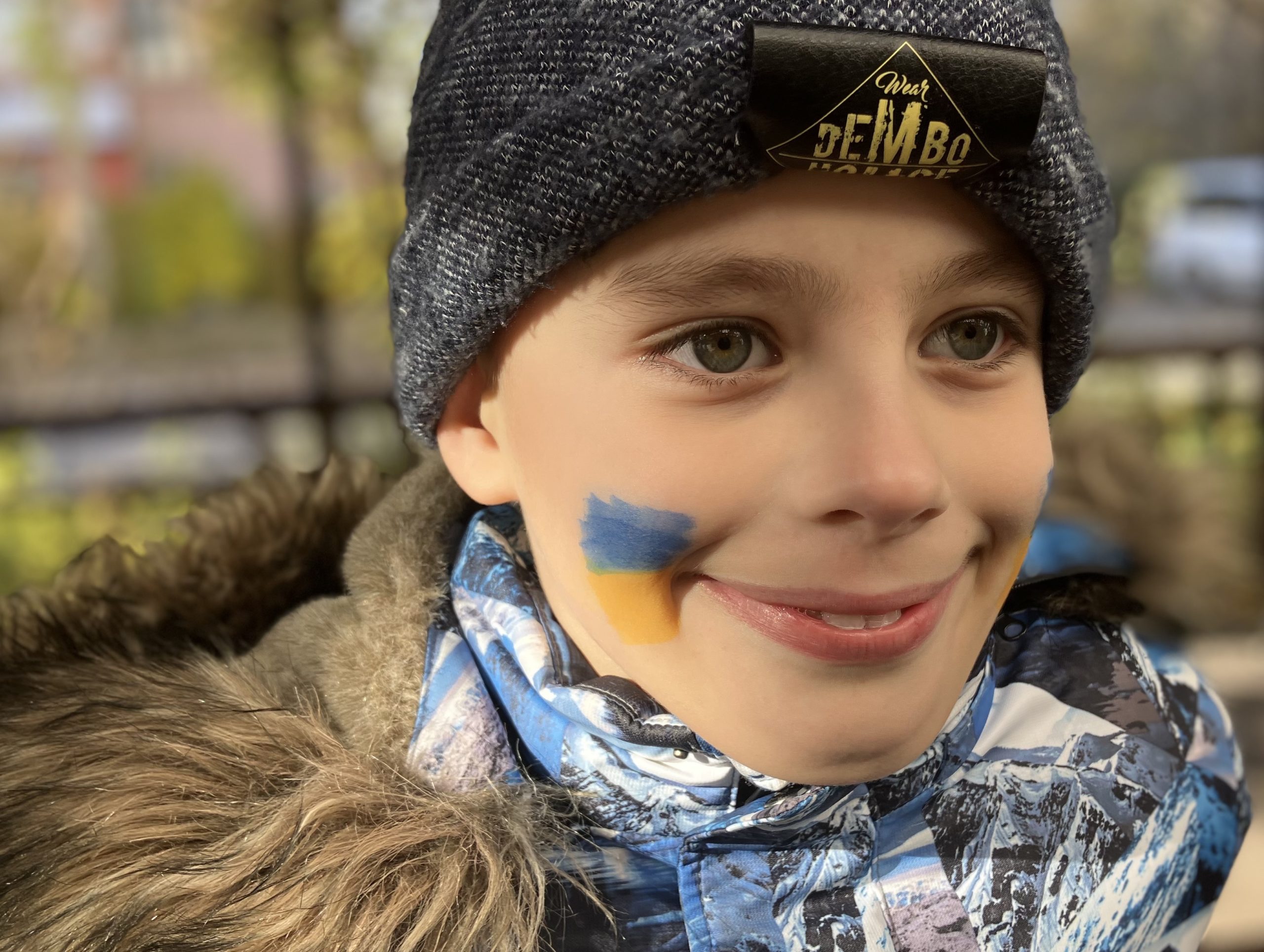
“We couldn’t believe it!” Kherson residents on the liberation of the city
“We couldn’t believe it, we thought it was a dream! We didn’t know what was going on! There was no Internet for so long—and no water, power—and we still don’t have any of this,” said a woman in her 70s, crying.
On the third morning after liberation, Ukrainian authorities returned to the city and installed generators and Internet connection spots downtown.
“We didn’t charge our phones for a long time,” shared a couple, waiting for their phones to be charged by the generator in the main square. “Our children are in Germany and in Lviv. We didn’t speak to them for two weeks. They know what’s going on, they have news but they have not heard it from us!”
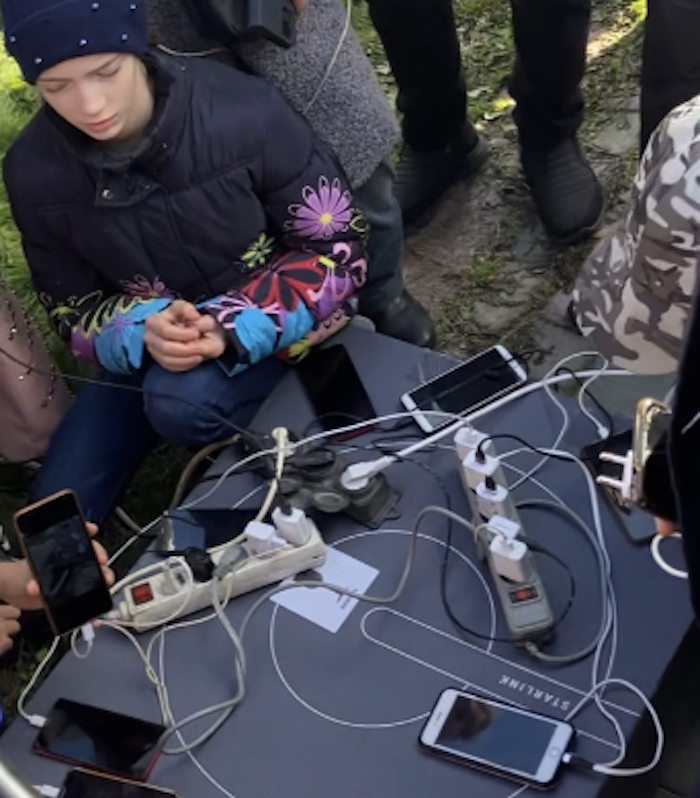
“They blocked TV and Facebook, and we only could watch Russian TV,” said another woman. “We knew nothing.”
“We didn’t have power and Internet from October 22 till the beginning of November, and then November 4 and until now. I want to call my son and my niece,” said an elementary school teacher with 42 years of work experience, holding a small dog in a yellow-and-blue vest.
“Russians took everything: they took the childhood from our first graders. We did not notice how spring went by, how we lived through the summer, and the fall came, with golden leaves. I will teach my students, always, to love our land and hate its enemies. Do you know how many of our people have perished?” she added.
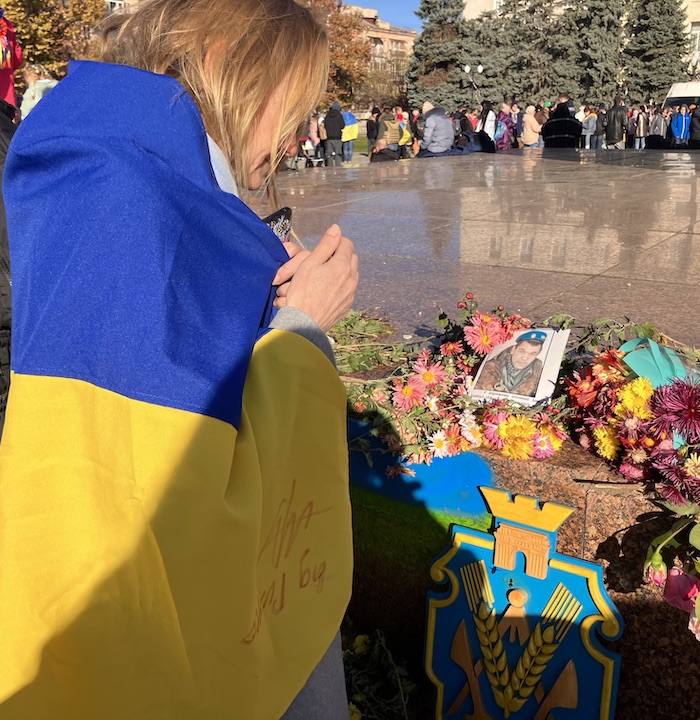
“We feel euphoria, and can’t believe this is happening. Even when we were told that we were liberated, we first didn’t believe it and thought it was a provocation because we didn’t have Internet,” said a mother for several young children, crying.
“It is an amazing feeling. We didn’t believe it for two days. […] We are so happy that the fire engines and ambulances are being returned to us, everything that was taken away from us, and that life resumes,” said her friend.
“On November 11, I heard some loud sounds, looked outside and saw our transport, with our flag! I ran outside, screaming with joy, and all the people were there, screaming, too… with flags,” a young man finally got his phone connected and spoke loudly. “I didn’t know people had so many flags lying around.”
“People had them at home, stored, in piles,” answered a young woman, also on the phone.
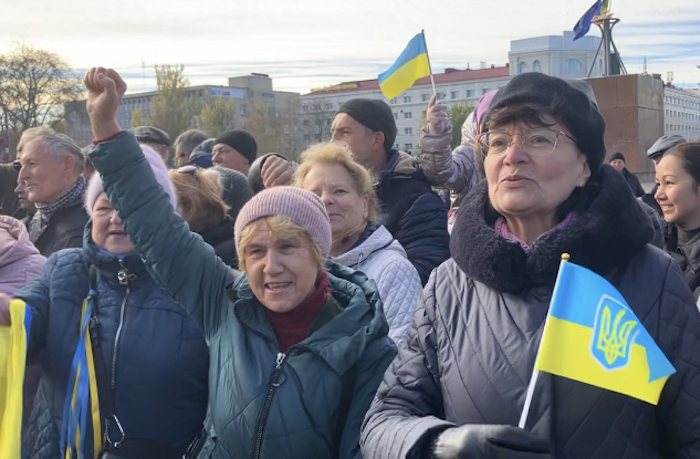
“Eight months of hell and hope”: living through the Russian occupation of Kherson
“For three days, we have indescribable feelings of happiness and joy,” said a mother of a ten-year-old boy, who was jumping with joy next to her. They finally got their phones connected to the Internet. “We waited for our girls and boys, our soldiers, for eight months. We are calling our friends and relatives in Kyiv, those who have left, and are waiting to return home.”
“The joy of freedom… the joy of not being occupied anymore. The joy of getting back to our normal, free life, in our own land. Eight and a half months of occupation…eight and a half months of hell and hope that we will come back to life that we lived before: good, fun, peaceful, happy life,” said a lady in her 60s, waving at the president.
“Nine months! We have been told not to go outside but we just ran outside! We were stopping every car that was passing by our street, hugged our soldiers, and kissed them! The fourth day of freedom, the fourth day of happiness!… There is no light, heat, or Internet, but we have freedom! Everything will be well!” said a woman in her 40s, wiping tears. “And we want to work!”
“Fear”
“It’s the fourth day—and I have never felt like this before! I don’t think there will be anything like this before. It happens only once in a lifetime. And, this will never happen again. Nobody will ever occupy us again. Never! We will not allow it! And glory to our soldiers, and to our President!” said a woman, wearing a Ukrainian flag like a scarf, eyes shining. “First, we felt fear. Then, we realized that they do not shoot just anyone walking down the street, and we stopped fearing as much.”
“It’s the feeling of freedom. It is easy to breathe now… There is no pressure anymore. People came to life; the city came to life. Nobody puts the gun to your head or aims at you just because you are crossing the street. It was dangerous to be outside,” said a woman in a yellow hat.
Many residents came to the square dressed in national flag colors or wrapped in the flags.
Her friend answered, “It was dangerous to be inside, too, even in your own home. Before, whenever you heard dogs barking, you started looking out the window because the Russians were breaking into our yards, day and night. They were checking, looking, and you just didn’t feel safe.
And now it’s hard to believe that it is possible not to be afraid. We were afraid to do anything on the phone: you could be detained for that. We couldn’t transfer money freely—they could check it as well and detain you. Same goes for providing help to on social media. In the street, they searched your purse, and checked the place of residence in your passport.”
“I now know what is prison-like. We had nine months of prison,” said a woman with a Ukrainian flag ribbon in her blonde hair. “I know also know what is freedom. I bow to every soldier, their parents, and our President. I have no words. I just hope they clean our streets of these billboards.”
Her husband added, “Freedom! We can do whatever we want. We can speak the way we want. We don’t have to hide away, be afraid. We attended every protest and it was scary when they first started to shoot at us and used gas. Still, we were so happy to see how many people stepped out for Ukraine! We did have Russian collaborators here, too. Some stayed and some left. I just hope they don’t come back.”
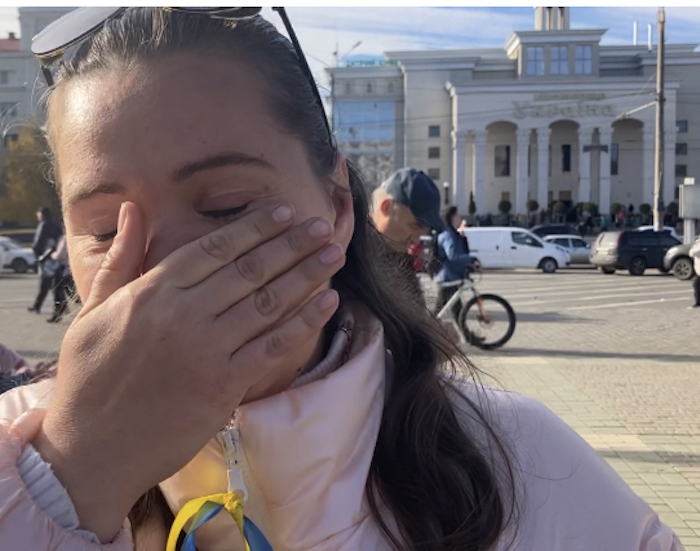
“I live on the third floor, and across the street, I can see a few private houses. Someone reported the young men who had thrown Molotov cocktails at the Russian military during the first days of the invasion,” said an old lady with a walking cane.
“You should have seen it, the brutality of the arrest! I saw it with my own eyes, how they twisted their kids’ arms behind their backs. And now, after November 11, you should see our people’s faces, everyone’s out in the streets, faces lit up. I didn’t go outside for the first three months. On November 12, I walked a few blocks and everyone was meeting and hugging.
Everyone just tried to stay in to not get on their radar. You stepped out, ran errands, and rushed back home. There were checkpoints everywhere, and Russian vehicles with the letter Z, with armed soldiers on top, patrolling around. It was scary because we don’t know what was on their mind. Who invited them here? To liberate us from what? I lived and I was breathing freely.”
“We can breathe now”
Many people spoke of being able to breathe, of literally feeling the air becoming lighter.
“It’s so much lighter! Tears of joy! Kherson was under occupation longer than any other place. It was so hard to co-exist with people… no, they are not people… who seized our land. Our kid didn’t go to school, we didn’t let him. He studied at home, online. And tried to sing Glory to Ukraine outside!” a family—mother, father and a ten-year-old son—spoke, interrupting each other.
“Our neighbors’ daughter and her girlfriend were arrested,” said a man walking a small dog. “Their daughter was released in a week but her friend is still missing. We don’t know her whereabouts. […] Our feelings are hard to put in words.
Goosebumps. I used to walk around my house, looking at this restaurant, where the Russians had lunch every day, outside, at a veranda. And I was thinking, can’t someone mine their tables?
And now—a completely different mood. Before, I would just walk my dog. And now, we walk around, freely, and people are dressed up nicely! Before, no one would step outside after 4 pm, and now people are still out at 7 or 8 pm.
We are so glad that our soldiers managed to do it! I have just heard that my birth town, Oleshky, was liberated. My whole family is buried there. My nephew died on March 1 but the area was occupied and they wouldn’t let us. I couldn’t go to the funerals. Now I can go to the cemetery.”
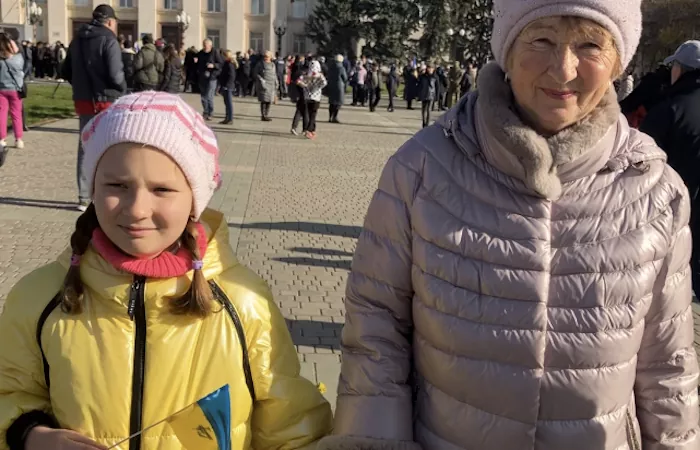
“Emotions are overwhelming,” said the grandmother of ten-year-old Sophia, speaking Russian. “It is so much easier to breathe! So much gratitude to our army and President!”
Sophia spoke Ukrainian, “It is so beautiful and light, and the sun is shining. My friends and I played outside, and drew pictures. I went to an online school during the occupation, and there were explosions so I had to hide in the hallway.”
“Kherson is Ukraine!”
“When they held their ‘referendum’, a woman walked around and two men with Kalashnikovs followed her down the streets. People didn’t open the doors. I didn’t see one person who would vote. They put their boxes for ballots next to supermarkets, still, not one person would voluntarily vote.
Everyone was hiding. The city looked like a ghost town. This referendum was a circus. They knew their numbers before the referendum because there was this huge pro-Ukrainian protest in the very beginning of the occupation. The Russians sat on top of their armored vehicles and everyone shouted at them, ‘Go home!’ They knew that it was a pro-Ukrainian region,” another woman said.
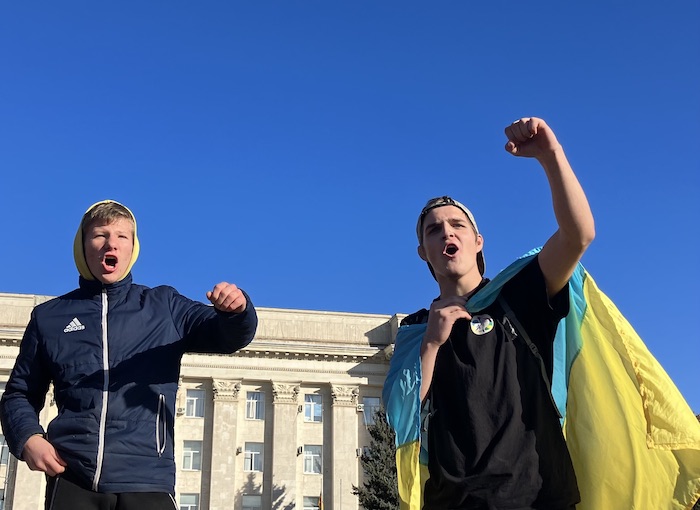
“It is the beginning of the end of the war,” said Zelenskyy.
Related:
- Ukrainian troops enter Kherson – media, Ukrainian intel
- Moscow TV is almost silent on Russian retreat from Kherson, so Russians turn elsewhere
- Kherson defeat could end Putin’s Victory cult as Crimean War defeat did Russia’s 19th-century one, Klishin Says
- Russian occupiers proudly steal raccoon & rest of animals from Kherson zoo

